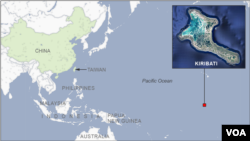U.S. lawmakers are voicing concern about the Pacific island nation of Kirabati's use of police from China for security, just as the U.S. State Department warns that such cooperation could bring new risks to Kiribati, a neighbor of Hawaii.
On Friday, Eeri Aritiera, Kirabati's acting police commissioner, told Reuters that a Chinese police delegation will rotate through the island nation to "provide assistance" to Kiribati's Community Policing program and IT department.
Aritiera says the island nation of more than 115,000, whose closest island is about 2,100 km (1,305 miles) from Hawaii, requested China's policing assistance in 2022.
In an email to VOA, a U.S. State Department spokesperson said the U.S. conducts police training in Kiribati. The spokesperson also raised concerns about the "potential implications that security agreements and security-related cyber cooperation" with China may have for a nation's sovereignty.
"We do not believe importing security forces from [China] will help any country," he said in an email to VOA.
Worried about losing ground
U.S. lawmakers worry Washington is losing ground to the People's Republic of China in the Pacific, a region that's critical to national security.
"The PRC's policing activities in Kiribati are a clear sign of Beijing's growing influence in Pacific island countries through lawfare. It's also a sign of the democracy-eroding effects of the PRC's diplomatic isolation of Taiwan," said U.S. Representative Raja Krishnamoorthi, the ranking member on the House Select Committee on the Strategic Competition Between the U.S. and the Chinese Communist Party or CCP.
"If we don't engage more with our Pacific partners like Kiribati to counter this CCP malign influence, we could face serious trade and national security issues, said U.S. Representative Neal Dunn, a Florida Republican who also serves on the Select Committee.
"Kiribati wants a consistent on-the-ground relationship with the United States," acknowledged democratic U.S. Representative Ed Case of Hawaii in an email to VOA, adding the region "needs help building capacity to address basic services."
Others on the committee worry about the corrosive impact on Pacific nations as they depend more for security on police from an authoritarian state where due process often goes unenforced.
"The CCP gives zero value to human life and will most certainly intend to use Kiribati's strategic position to their advantage, said U.S. Representative Michele Steel in a statement to VOA. Steel also serves on the Select Committee.
VOA asked the Chinese Embassy in the U.S. to comment on the reports about the new Chinese police presence in Kiribati.
Chinese Embassy spokesperson Liu Pengyu responded to VOA in an email that China "always engages in cooperation with relevant countries on the basis of equality, mutual respect, mutual benefit, openness and inclusiveness."
China grows police partnerships
In recent years, Beijing has increasingly positioned itself as the public safety partner of choice for Pacific nations experiencing instability. In January, Papua New Guinea requested Chinese police assistance after riots killed 15 people.
In 2022, the Solomon Islands entered into a security pact with Beijing, and a year later, Prime Minister Manasseh Sogavare signed a police cooperation deal with China for two years. Both Kiribati and the Solomons switched diplomatic ties from Taiwan to Beijing in 2019.
But others in the region are re-examining their police agreements with China. In January 2023, after 12 years of cooperation with Beijing on policing, Fiji's newly elected prime minister — Sitiveni Rabuka — fired the country's police commissioner and promised to end a police training agreement that allowed Chinese police officers to be stationed in Fiji.
"If our systems and our values differ, what cooperation can we get from them?" said Rabuka last June, referring to China.
Lawmakers: Funding delay sends wrong message
With Chinese funds surging to the region — as much as $3.148 billion between 2008 and 2020, according to the Sydney-based Lowy Institute — many in Congress are questioning why their fellow lawmakers still haven't passed a funding package for three Pacific allies that are also facing economic pressure from Beijing.
The agreement, known as the Compacts of Free Association or COFA, provide $7 billion in economic aid over 20 years to Palau, Micronesia and the Marshall Islands. It was signed last year.
Earlier this month, the funding was dropped from the security supplemental in the U.S. Senate under pressure from conservatives who wanted to lower costs. With no amendment process permitted, the funds could not be added back in.
U.S. representative Aumua Amata Coleman Radewagen represents the U.S. Pacific territory of American Samoa — some 2,500 kilometers (1,553 miles) southeast of Kiribati.
In a statement to VOA, she called COFA "the clearest signal the U.S. can send renewing American commitments to freedom, democracy and well-being for our three closest allies, and the entire Pacific region."
U.S. Senator Mazie Hirono of Hawaii agrees, warning in an email to VOA that further delay in passing COFA "opens the door for China to make similar overtures to the COFA nations."















